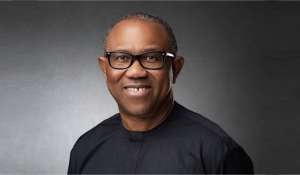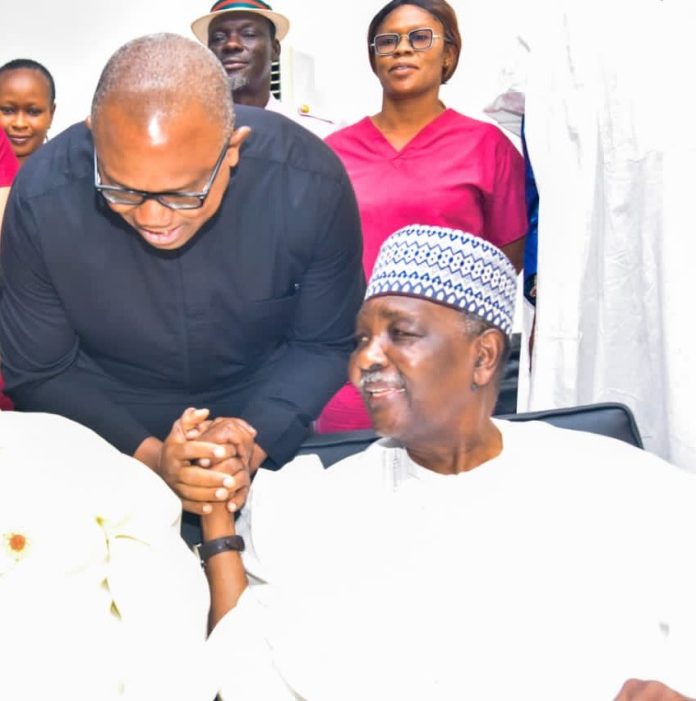Peter Obi, a key Nigerian presidential hopeful, has recently found himself at the center of controversy after visiting former Head of State General Yakubu Gowon to mark his 90th birthday. General Gowon, who led Nigeria during one of the most turbulent periods in the nation’s history—the Nigerian Civil War, commonly known as the Biafran War—remains a divisive figure. The war, which took place between 1967 and 1970, resulted in the deaths of an estimated 3.5 million people, mostly from the Igbo ethnic group, and continues to evoke deep emotions across Nigeria, particularly among the Igbo people.
During the visit, Peter Obi, a politician with significant support from the southeastern region of Nigeria, praised Gowon’s role in Nigerian history, focusing on his efforts to maintain the country’s unity amidst conflict. “I am privileged to join other Nigerians of goodwill to celebrate a highly respected leader and former Head of State, General Yakubu Gowon, on his 90th birthday anniversary,” Obi said.
He went on to commend Gowon for standing for peace during a time of great strife: “In a time of hate, you stood for love. At a time of strife, you stood for peace. At a time of division, you stood for unity. Your life of service to our great nation, Nigeria, stands as one of sacrifice, leadership, and unity. Your steadfast commitment to preserving the peace and sovereignty of Nigeria during a challenging period in our history will forever be remembered and revered.” Obi concluded his tribute by wishing Gowon continued good health and wisdom, stating, “As we celebrate this milestone, I pray that God continues to grant you good health, wisdom, and the grace of true fruitfulness.”
However, Obi’s statement did not sit well with many Nigerians, particularly those from the Igbo ethnic group, who still harbor deep resentment over the events of the Biafran War and the heavy loss of lives that occurred under Gowon’s leadership. Critics quickly took to social media and various platforms to express their discontent, accusing Obi of disregarding the painful history and the unresolved wounds of the Igbo people.
Backlash from Igbo Community
Dr. Maduka Chinemelum, an outspoken advocate for Biafra’s restoration, led the charge against Obi, accusing him of betraying his heritage. “You claim to be intelligent, educated, smart, and sound,” Chinemelum remarked angrily. “Yet you dismiss those of us fighting for the restoration of Biafra. You are a Nigerian in a country where your passport is not respected anywhere in the world, where you have no good roads, no healthcare system, no constant electricity, no pipe-borne water, no Nigerian Airways, and where your currency is useless, with £1 equal to 2300 naira. Of what use is your education? Shame on you! I prefer to be an illiterate Chinese to being an ‘educated’ Nigerian.”
Other prominent voices from the Igbo community expressed similar sentiments, viewing Obi’s praise of Gowon as an affront to the memory of the millions who perished during the war. George Oha, a vocal critic of Gowon’s leadership, labeled the former leader as the “architect of modern Nigerian Igbophobia.” He recounted the devastation inflicted on Biafra during the war, stating, “Gowon invaded Biafra with Operation Unicord, overseeing the massacre of many innocent civilians, including children. He balkanized the Igbos by creating new states and taking away our oil-rich regions. This is the man who stole billions for a steel project and pushed anti-Igbo rhetoric. He even doubled down on his decisions a few months back. After all, he was removed from office while giving a speech—terrible leader and a terrible person altogether.”
Supporters Defend Gowon’s Legacy
Despite the outcry, not all reactions to Obi’s visit were negative. Some Nigerians came to the defense of both Gowon and Peter Obi’s decision to honor him. Moses Azano, for instance, argued that it was unfair to expect no loss of life during a war. “It was a war. Were you expecting people not to die?” Azano questioned. “Gowon could have gone on a bloodlust after victory, but instead, he chose reconciliation. In my book, he is an honorable man.”
Others pointed out that while Gowon’s leadership during the war remains controversial, he made efforts toward reconciliation with the Igbo people, launching the “No victor, no vanquished” policy after the war ended. This policy aimed at national healing and rebuilding Nigeria’s fractured unity. However, critics argue that these reconciliatory efforts did little to address the systemic marginalization of the Igbo people in the decades following the war.
Complex Legacy of General Gowon
General Gowon’s legacy in Nigerian history is undoubtedly complicated. As Nigeria’s youngest-ever leader, taking power at the age of 31, he faced the daunting task of managing a country on the brink of collapse. His decision to prosecute the war against Biafra was motivated by a desire to preserve Nigeria’s territorial integrity, yet the methods employed during the war—including the infamous blockade that led to widespread famine in Biafra—have left scars that continue to fester.
Ramotu Olaniyo, another Nigerian, reflected on Gowon’s actions during the war and their consequences today. “His people of the Middle Belt are suffering the consequences of his rash decision as Head of State. Plateau is among the states where herdsmen are constantly attacking and sacking entire communities,” Olaniyo said, hinting that Gowon’s decisions as a leader have had long-lasting repercussions beyond the war.
As Peter Obi’s visit to Gowon highlights, Nigeria is still grappling with the unresolved tensions stemming from the civil war, over 50 years after it ended. For some, Gowon remains a symbol of peace and unity. For others, especially within the Igbo community, his legacy is one of pain, loss, and unresolved grievances. As Nigeria moves toward another critical presidential election, the debate over how to reconcile the nation’s past and heal its divisions remains as relevant as ever.
Anthony Emeka Nwosu




